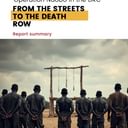On December 15 the United Nations High Commissioner for Human Rights marked the 20th anniversary of an international death penalty treaty by calling for the universal abolition of capital punishment. Navi Pillay, the top UN human rights official, urged all states to adopt the Optional Protocol to the International Covenant on Civil and Political Rights. The protocol, which bars the death penalty, was introduced in 1989. “Abolishing the death penalty is a difficult process for many societies,” she said. “[A]nd ratification of the Optional Protocol can often only come about after a period of national debate. Until they reach that point, I urge those States still employing the death penalty to place a formal moratorium on its use, with the aim of ultimately ratifying the Optional Protocol and abolishing the punishment altogether everywhere.” In her statement, she enumerated a number of issues with the death penalty, including “the fundamental nature of the right to life; the unacceptable risk of executing innocent people by mistake; the absence of proof that the death penalty serves as a deterrent; and what is, to my mind, the inappropriately vengeful character of the sentence.” To date, 140 countries no longer carry out the death penalty, and 72 countries have ratified the Optional Protocol on ending the death penalty. Read the full statement below.
UN human rights chief calls for universal abolition of the death penalty
15 December 2009 – The top United Nations human rights official today called for the universal abolition of the death penalty, citing a host of reasons ranging from the fundamental right to life to the possibility of judicial errors.
“I am opposed to the death penalty in all cases,” UN High Commissioner for Human Rights Navi Pillay said in a message marking the on 20th anniversary of the Death Penalty Optional Protocol which was added to the International Covenant on Civil and Political Rights (ICCPR) in 1989 with the aim of abolishing the punishment.
“I hold this position for a number of reasons: these include the fundamental nature of the right to life; the unacceptable risk of executing innocent people by mistake; the absence of proof that the death penalty serves as a deterrent; and what is, to my mind, the inappropriately vengeful character of the sentence.”
Ms. Pillay noted that 140 States no longer carry out the penalty. The 72 States which have ratified the Protocol are duty-bound not to execute anybody, to take all necessary steps to definitively abolish the death penalty, and not to extradite individuals to a country where they would face the death penalty.
“Ratification of the optional protocol, as well as similar regional instruments in Europe and in the Americas, thus draws a firm line under the use of the death penalty,” she said, noting that the instrument is a key step for states moving towards abolition.
“Abolishing the death penalty is a difficult process for many societies, and ratification of the Optional Protocol can often only come about after a period of national debate. Until they reach that point, I urge those States still employing the death penalty to place a formal moratorium on its use, with the aim of ultimately ratifying the Optional Protocol and abolishing the punishment altogether everywhere.”
(“UN human rights chief calls for universal abolition of the death penalty,” UN News Centre, December 15, 2009). See also International.


